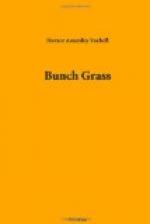XII
THE BABE
One of the Britishers who came to Paradise was an Irishman, the son of an archdeacon with a large family and a small income. He was a strapping fellow, strong and sturdy as a camel—and quite as obstinate. He always spoke affectionately of his people, but I fancy they were not deeply grieved when he left England. I dare say he was troublesome at home; you know what that means. However, he was warmly welcomed in Paradise, for he brought with him two hundred pounds in cash, and a disposition to spend it as quickly as possible. Ajax christened him The Babe, because he had a milk-and-roses complexion, and a babe’s capacity for, and love of, liquid refreshment. Perhaps the archdeacon thought that the West was a sort of kindergarten, where children like The Babe are given, at small expense, object-lessons and exercises peculiarly adapted to young and plastic minds. In Central America certain tribes living by the seaboard throw their children into the surf, wherein they sink or learn to swim, as the Fates decree. Some sink.
When The Babe’s two hundred pounds were spent, he came to us and asked for a job. He said, I remember, that he was the son of an archdeacon, and that he could trust us to bear that in mind. We were so impressed by his guileless face and cock-a-hoop assurance, that we had not the heart to turn him away.
At the end of a fortnight Ajax took pencil and paper, and computed what The Babe had cost us. He had staked a valuable horse; he had smashed a patent reaper; he had set fire to the ranch, and burnt up five hundred acres of bunch grass; and he had turned some of our quiet domestic cows into wild beasts, because—as he put it—he wished to become a vaquero. He said that the billet of foreman would just suit his father’s son.
“The equivalent of what The Babe has destroyed,” said my brother Ajax, “if put out at compound interest, five per cent., would in a hundred years amount to more than fifty thousand pounds.”
“I’m awfully sorry,” murmured The Babe.
“I fear,” observed Ajax to me later, “that we cannot afford to nurse this infant.”
I was of the same opinion; so The Babe departed, and for a season we saw his chubby face no more. Then one day, like a bolt from the blue, came an unstamped letter from San Francisco. The Babe wrote to ask for money. Such letters, as a rule, may be left unanswered, but not always. Ajax and I read The Babe’s ill-written lines, and filled in the gaps in the text. Connoted and collated, it became a manuscript of extraordinary interest and significance. We inferred that if the sum demanded were not sent, the writer might be constrained to cast himself as rubbish to the void. Now The Babe had his little failings, but cowardice was not one of them. Indeed, his physical courage redeemed in a sense his moral and intellectual weakness.




